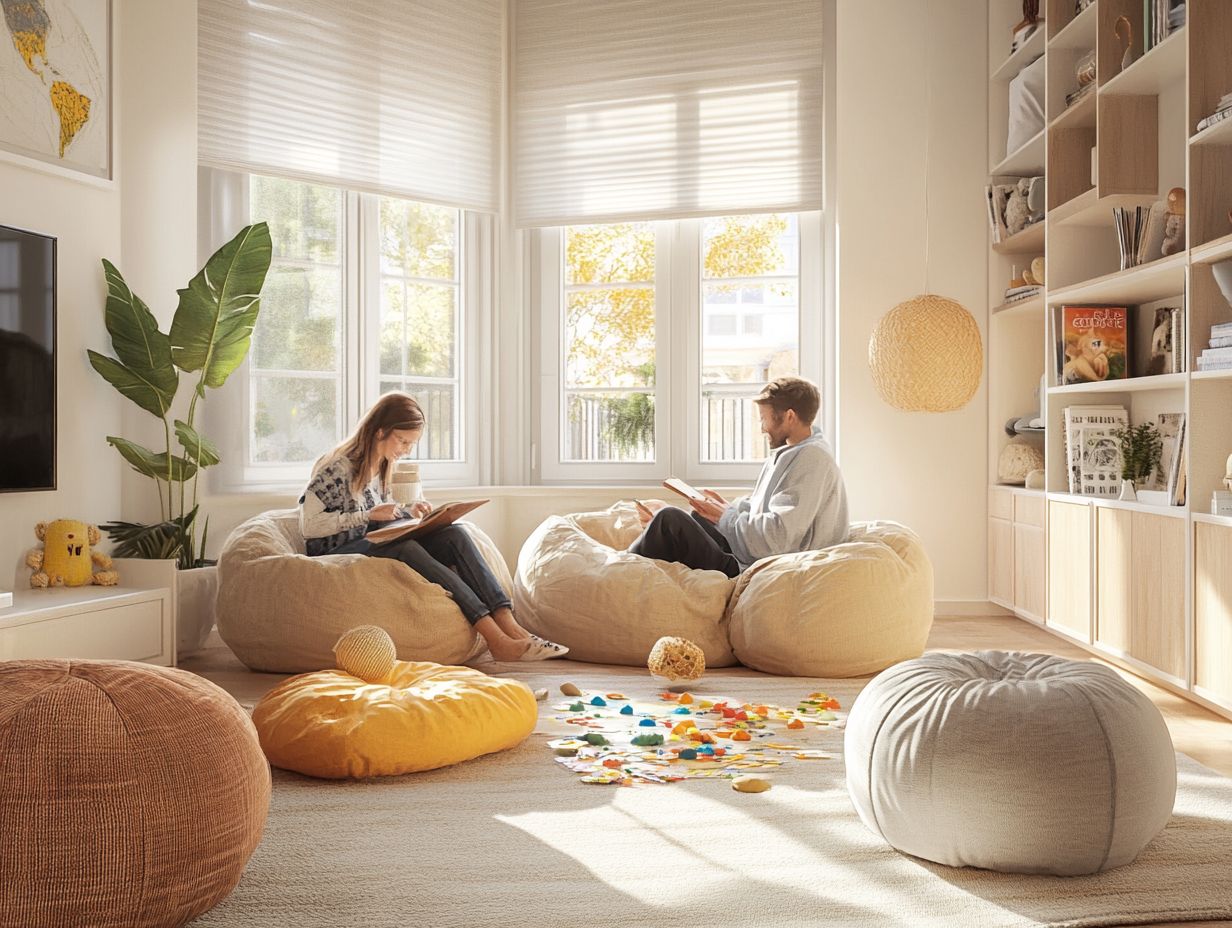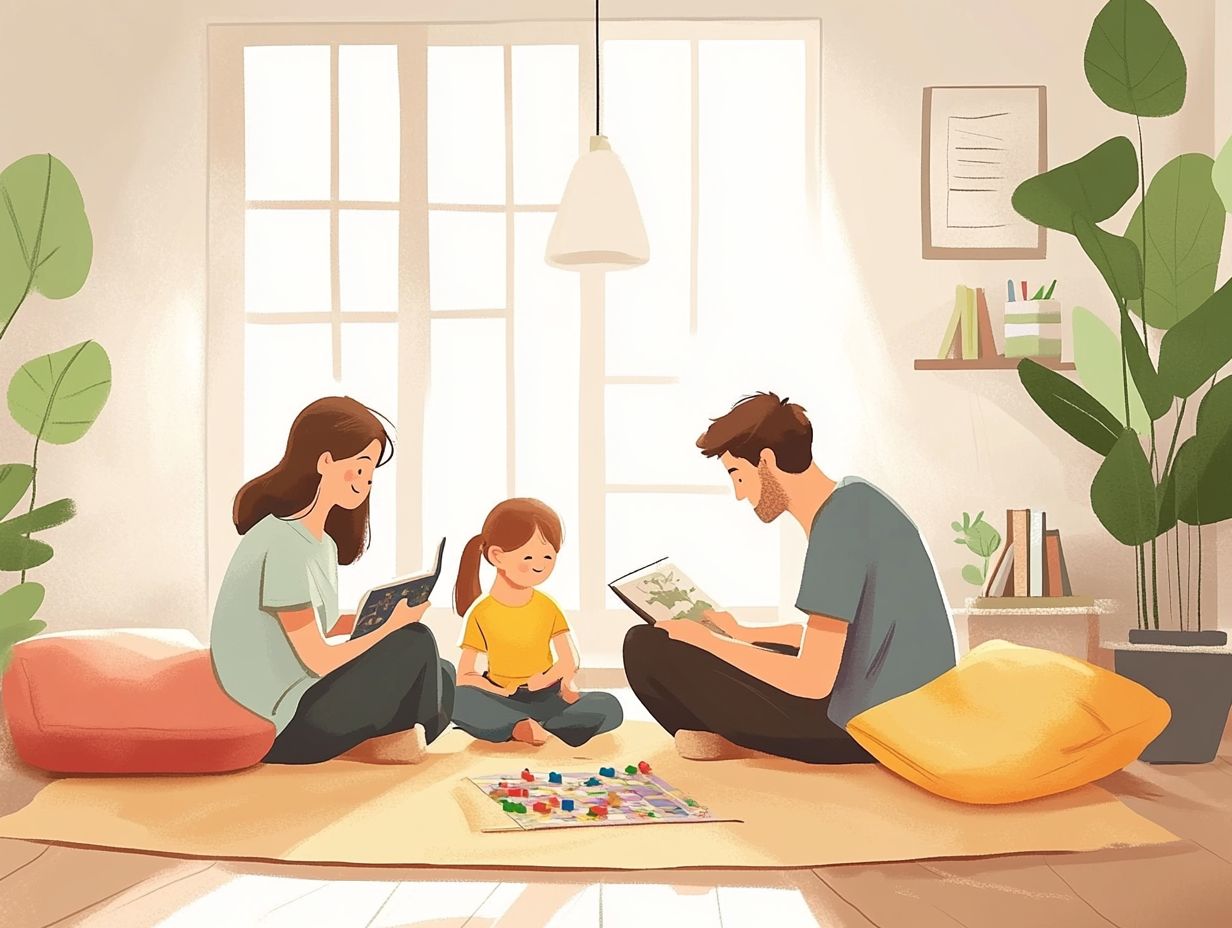Integrating Relaxation into Family Life
In today s fast-paced world, you might find your family caught up in a whirlwind of activities, leaving little room for much-needed relaxation.
Integrating moments of calm into your daily routine can significantly boost the well-being of both parents and children. This article will reveal how relaxation benefits your family, providing practical strategies to weave relaxation into your busy schedules and offering tips for cultivating a serene home environment.
You ll discover techniques that promote tranquility and learn how to prioritize family downtime, making it easier for new parents to navigate common challenges. Embrace the power of relaxation and witness the transformation in your family life.
Contents
- Key Takeaways:
- The Importance of Relaxation in Family Life
- Practical Ways to Incorporate Relaxation into Daily Routines
- Creating a Relaxing Environment at Home
- Essential Relaxation Techniques for Family Harmony
- Making Time for Family Relaxation
- Addressing Common Challenges
- Frequently Asked Questions about Family Activities and Mindfulness
- What are some benefits of integrating relaxation into family life, including meditation?
- How can I incorporate relaxation techniques into my family’s daily routine?
- What are some strategies for encouraging children to participate in relaxation activities?
- Is it important for the whole family to participate in relaxation activities?
- Can relaxation techniques and emotional intelligence be helpful in resolving conflicts within the family?
- Are there any potential challenges or barriers to integrating relaxation into family life?
Key Takeaways:

- Incorporating relaxation into family life can have numerous benefits for both parents and children, including better emotional management and mental health.
- Busy families can use simple strategies, such as prioritizing and scheduling family time, to create space for relaxation in their daily routines.
- Designing a calming environment at home and practicing relaxation techniques like breathing exercises and meditation can help families find balance and overcome resistance to relaxation.
The Importance of Relaxation in Family Life
In today s fast-paced world, you can t underestimate the importance of relaxation in family life. It enhances emotional management and well-being while deepening the connection between you and your children an essential element for nurturing environments where mindful parenting can thrive.
By embracing mindfulness, your family can manage stress more effectively and cultivate self-compassion. This allows you to savor the parenting journey to its fullest through focused attention and presence.
Benefits for Parents and Children
The benefits of relaxation for you and your children are profound, offering improved emotional support, enhanced mental health, and a deeper connection within your family unit.
Incorporating relaxation into your daily life can significantly boost emotional intelligence, enabling your family to navigate feelings more effectively and understand each other s perspectives. Imagine taking nature walks together; they provide a serene backdrop and foster resilience by creating opportunities for open discussions about life s challenges.
Engaging in storytelling sessions can also enhance stress management skills. As your children learn to express their emotions creatively, you, as a parent, can practice the art of active listening. Together, these cherished family moments cultivate an environment where relationships flourish, promoting a sense of security and well-being for everyone involved.
Practical Ways to Incorporate Relaxation into Daily Routines
Incorporating relaxation into your daily routine is not just practical; it can be remarkably effective. This allows you and your family to prioritize mindfulness practices that enhance well-being and foster emotional management amid the whirlwind of parenting.
Even simple adjustments to your daily activities can lead to significant improvements in stress management and the overall quality of family life, promoting a more nurturing environment for everyone involved.
Simple Strategies for Busy Families
For busy families like yours, implementing simple strategies such as short mindfulness exercises and calming activities like guided meditations can truly elevate relaxation and emotional well-being.
Integrating mindful listening during conversations is another powerful technique. This fosters deeper connections and ensures that every family member feels heard and valued.
Start a gratitude journaling practice today! Just a few moments each day spent reflecting on what you re thankful for can cultivate a positive mindset, enhancing overall harmony within your home.
Remember, consistency is key. Regular practice encourages trust and emotional resilience, ultimately leading to more supportive and understanding family dynamics.
Even the smallest, intentional actions can create a ripple effect, transforming everyday interactions into meaningful moments of connection.
Try one of these relaxation strategies this week and see how it changes your family dynamic!
Creating a Relaxing Environment at Home

Creating a calming home environment helps parents be more mindful and boosts emotional intelligence in the family. It establishes a sanctuary where everyone feels safe and cared for.
This supportive atmosphere significantly contributes to your family’s wellness journey, encouraging practices that foster inner peace and deeper connections, essential for maintaining resilience.
Designing a Calming Space
Designing a calming space within your home can greatly enhance the emotional support you provide to your family. Thoughtfully selected elements promote mindfulness and relaxation.
Imagine comfortable seating options, like oversized cushions or ergonomic chairs, inviting everyone to sink in and unwind. Bringing in views of nature whether through expansive windows or vibrant indoor plants adds a refreshing touch that cultivates peace.
You can elevate the ambiance with mindfulness prompts, such as inspirational artwork or the soothing scents from essential oils, nurturing a serene atmosphere. This tranquil space can become a haven for activities like meditation or gentle yoga, creating opportunities for connection, emotional expression, and supportive dialogue.
This nurturing environment strengthens bonds and helps everyone manage emotions, allowing the family to thrive in harmony.
Essential Relaxation Techniques for Family Harmony
Incorporating relaxation techniques like breathing exercises and meditation into your routine can significantly elevate your family life. These practices help manage stress and nurture emotional well-being for everyone in the household.
Breathing Exercises, Meditation, and More
Breathing exercises, meditation, and mindfulness practices are invaluable tools for you and your family. They enhance emotional well-being, especially during parenting challenges.
These techniques not only promote individual tranquility but also strengthen family bonds by creating shared moments of introspection and connection. By carving out just a few minutes each day, you can engage in simple breath-counting exercises together. Imagine inhaling deeply for a count of four, holding for another four, and then exhaling for four. This rhythmic breathing can transform your cozy living room into a sanctuary of relaxation and laughter.
Guiding a family meditation session perhaps with soothing music or the gentle sounds of nature can cultivate a serene atmosphere. This encourages open dialogue about feelings and thoughts, reinforcing emotional understanding and support among family members.
Making Time for Family Relaxation
Making time for family relaxation is essential for nurturing emotional intelligence and enhancing overall well-being. It requires intentional scheduling and prioritization amid daily life’s hustle.
By dedicating moments for relaxation, you can strengthen family bonds and foster a healthier lifestyle.
Scheduling and Prioritizing Family Time

Scheduling and prioritizing family time for relaxation profoundly enhances emotional support and establishes a strong foundation for mindful parenting practices.
To truly make the most of this intentional time together, employ simple yet effective strategies, such as setting weekly reminders on shared calendars. This ensures everyone is aware of these cherished moments and prepared to engage fully.
Integrating relaxation activities think game nights, movie marathons, or outdoor adventures can elevate these occasions into beloved family traditions. This not only reinforces bonds but also creates shared memories that will be cherished for years to come.
Dedicating space for connection nurtures healthier family dynamics and elevates the parenting experience. It allows you to engage more meaningfully with your children’s lives, fostering emotional growth and resilience for everyone involved.
Addressing Common Challenges
Addressing common challenges in practicing relaxation as a family requires you to confront resistance and seek balance within your daily routines. This can often feel daunting and impractical, especially for new parents.
Yet, with ways to be present and supportive as parents and a dedication to emotional regulation, you can navigate these obstacles with grace and ease.
Overcoming Resistance and Finding Balance
Finding balance in family relaxation takes patience. Emotional support and mindfulness are key to this journey.
To encourage your family members to embrace these practices, consider introducing them gradually. Start with playful activities that involve the children, like mindful breathing exercises or simple yoga sessions that are fun and engaging.
When you demonstrate a commitment to these practices, it serves as a powerful example. It showcases the benefits of emotional support in nurturing a peaceful family environment.
Acknowledging any apprehensions and inviting open conversations about personal feelings can create a sense of belonging. This makes everyone more open to exploring mindfulness together.
By doing this, your family can cultivate a harmonious space where relaxation techniques seamlessly weave into daily life.
Frequently Asked Questions about Family Activities and Mindfulness
What are some benefits of integrating relaxation into family life, including meditation?
- Improved relationships
- Reduced stress and anxiety
- Increased quality time
- Better overall health and well-being
- Reinforced emotional support and connections
How can I incorporate relaxation techniques into my family’s daily routine?

Simple activities such as deep breathing exercises, mindfulness practices, calming exercises, and taking nature walks together can easily be incorporated into daily family life to promote relaxation.
What are some strategies for encouraging children to participate in relaxation activities?
Children may engage more in relaxation activities if they are fun and enjoyable. Parents can lead by example by practicing relaxation themselves through mindful practices or engaging in guided meditations.
Is it important for the whole family to participate in relaxation activities?
Yes, involving the whole family in relaxation activities fosters unity and support. It promotes a calm and peaceful environment in the household, which can be especially beneficial for new parents.
Can relaxation techniques and emotional intelligence be helpful in resolving conflicts within the family?
Yes, practicing relaxation techniques helps family members manage their emotions and communicate more effectively. This leads to healthier conflict resolution.
Are there any potential challenges or barriers to integrating relaxation into family life?
Some challenges may include:
- Finding time to practice relaxation
- Resistance from family members who are unfamiliar with these techniques
- Balancing different preferences for types of relaxation activities, especially in the parenting journey






